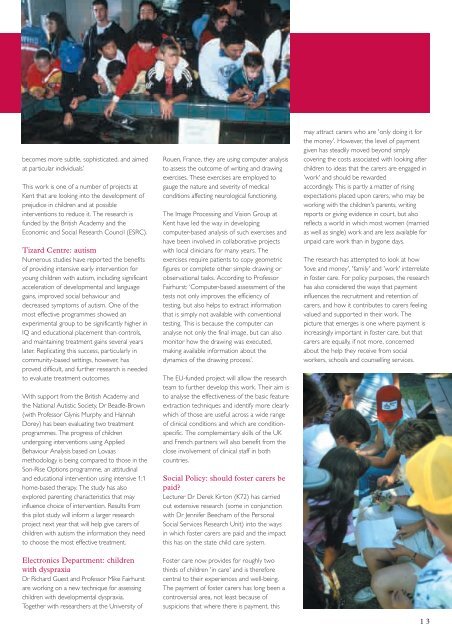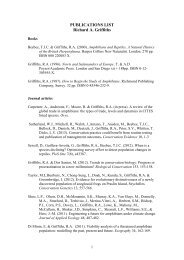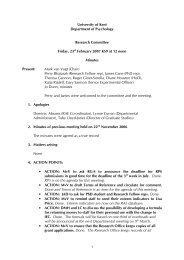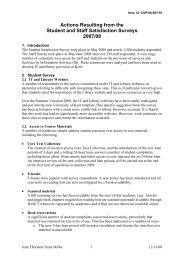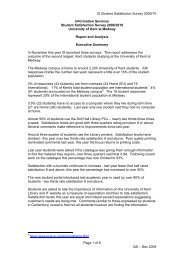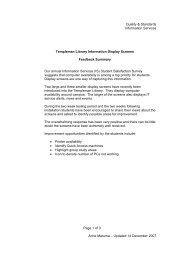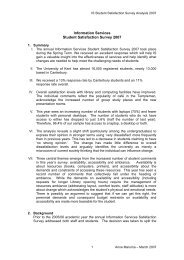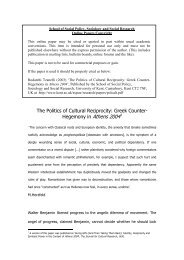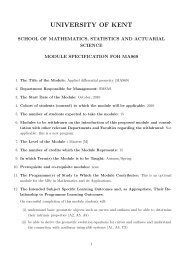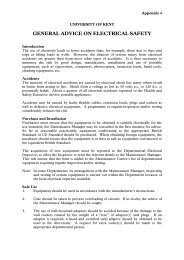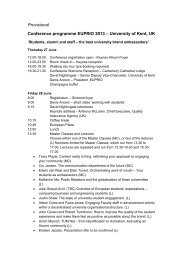Spring 2004 - University of Kent
Spring 2004 - University of Kent
Spring 2004 - University of Kent
You also want an ePaper? Increase the reach of your titles
YUMPU automatically turns print PDFs into web optimized ePapers that Google loves.
ecomes more subtle, sophisticated, and aimed<br />
at particular individuals.’<br />
This work is one <strong>of</strong> a number <strong>of</strong> projects at<br />
<strong>Kent</strong> that are looking into the development <strong>of</strong><br />
prejudice in children and at possible<br />
interventions to reduce it. The research is<br />
funded by the British Academy and the<br />
Economic and Social Research Council (ESRC).<br />
Tizard Centre: autism<br />
Numerous studies have reported the benefits<br />
<strong>of</strong> providing intensive early intervention for<br />
young children with autism, including significant<br />
acceleration <strong>of</strong> developmental and language<br />
gains, improved social behaviour and<br />
decreased symptoms <strong>of</strong> autism. One <strong>of</strong> the<br />
most effective programmes showed an<br />
experimental group to be significantly higher in<br />
IQ and educational placement than controls,<br />
and maintaining treatment gains several years<br />
later. Replicating this success, particularly in<br />
community-based settings, however, has<br />
proved difficult, and further research is needed<br />
to evaluate treatment outcomes.<br />
With support from the British Academy and<br />
the National Autistic Society, Dr Beadle-Brown<br />
(with Pr<strong>of</strong>essor Glynis Murphy and Hannah<br />
Dorey) has been evaluating two treatment<br />
programmes. The progress <strong>of</strong> children<br />
undergoing interventions using Applied<br />
Behaviour Analysis based on Lovaas<br />
methodology is being compared to those in the<br />
Son-Rise Options programme, an attitudinal<br />
and educational intervention using intensive 1:1<br />
home-based therapy. The study has also<br />
explored parenting characteristics that may<br />
influence choice <strong>of</strong> intervention. Results from<br />
this pilot study will inform a larger research<br />
project next year that will help give carers <strong>of</strong><br />
children with autism the information they need<br />
to choose the most effective treatment.<br />
Electronics Department: children<br />
with dyspraxia<br />
Dr Richard Guest and Pr<strong>of</strong>essor Mike Fairhurst<br />
are working on a new technique for assessing<br />
children with developmental dyspraxia.<br />
Together with researchers at the <strong>University</strong> <strong>of</strong><br />
Rouen, France, they are using computer analysis<br />
to assess the outcome <strong>of</strong> writing and drawing<br />
exercises. These exercises are employed to<br />
gauge the nature and severity <strong>of</strong> medical<br />
conditions affecting neurological functioning.<br />
The Image Processing and Vision Group at<br />
<strong>Kent</strong> have led the way in developing<br />
computer-based analysis <strong>of</strong> such exercises and<br />
have been involved in collaborative projects<br />
with local clinicians for many years. The<br />
exercises require patients to copy geometric<br />
figures or complete other simple drawing or<br />
observational tasks. According to Pr<strong>of</strong>essor<br />
Fairhurst: ‘Computer-based assessment <strong>of</strong> the<br />
tests not only improves the efficiency <strong>of</strong><br />
testing, but also helps to extract information<br />
that is simply not available with conventional<br />
testing. This is because the computer can<br />
analyse not only the final image, but can also<br />
monitor how the drawing was executed,<br />
making available information about the<br />
dynamics <strong>of</strong> the drawing process’.<br />
The EU-funded project will allow the research<br />
team to further develop this work. Their aim is<br />
to analyse the effectiveness <strong>of</strong> the basic feature<br />
extraction techniques and identify more clearly<br />
which <strong>of</strong> those are useful across a wide range<br />
<strong>of</strong> clinical conditions and which are conditionspecific.<br />
The complementary skills <strong>of</strong> the UK<br />
and French partners will also benefit from the<br />
close involvement <strong>of</strong> clinical staff in both<br />
countries.<br />
Social Policy: should foster carers be<br />
paid?<br />
Lecturer Dr Derek Kirton (K72) has carried<br />
out extensive research (some in conjunction<br />
with Dr Jennifer Beecham <strong>of</strong> the Personal<br />
Social Services Research Unit) into the ways<br />
in which foster carers are paid and the impact<br />
this has on the state child care system.<br />
Foster care now provides for roughly two<br />
thirds <strong>of</strong> children 'in care' and is therefore<br />
central to their experiences and well-being.<br />
The payment <strong>of</strong> foster carers has long been a<br />
controversial area, not least because <strong>of</strong><br />
suspicions that where there is payment, this<br />
may attract carers who are 'only doing it for<br />
the money'. However, the level <strong>of</strong> payment<br />
given has steadily moved beyond simply<br />
covering the costs associated with looking after<br />
children to ideas that the carers are engaged in<br />
'work' and should be rewarded<br />
accordingly. This is partly a matter <strong>of</strong> rising<br />
expectations placed upon carers, who may be<br />
working with the children's parents, writing<br />
reports or giving evidence in court, but also<br />
reflects a world in which most women (married<br />
as well as single) work and are less available for<br />
unpaid care work than in bygone days.<br />
The research has attempted to look at how<br />
'love and money', 'family' and 'work' interrelate<br />
in foster care. For policy purposes, the research<br />
has also considered the ways that payment<br />
influences the recruitment and retention <strong>of</strong><br />
carers, and how it contributes to carers feeling<br />
valued and supported in their work. The<br />
picture that emerges is one where payment is<br />
increasingly important in foster care, but that<br />
carers are equally, if not more, concerned<br />
about the help they receive from social<br />
workers, schools and counselling services.<br />
11 13


